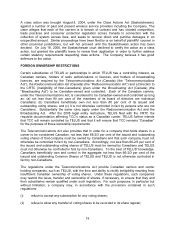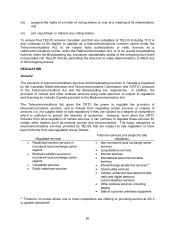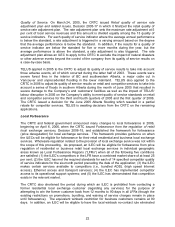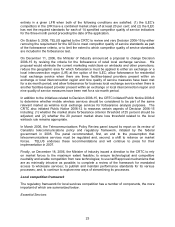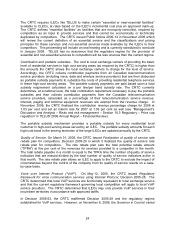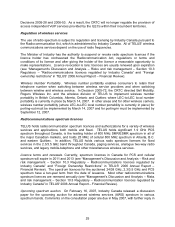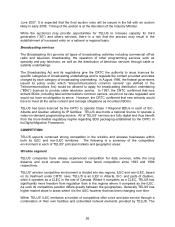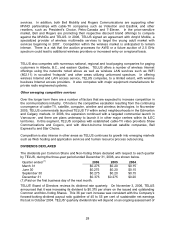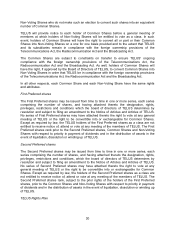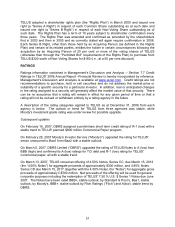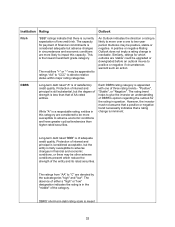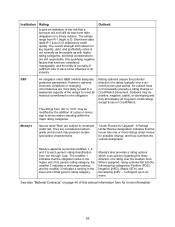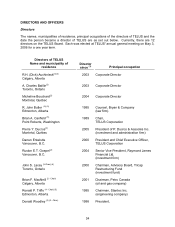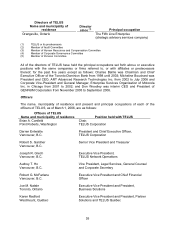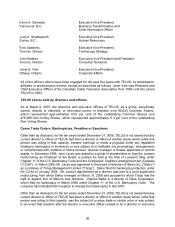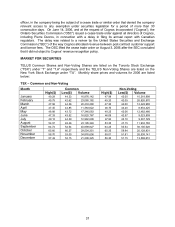Telus 2006 Annual Report Download - page 28
Download and view the complete annual report
Please find page 28 of the 2006 Telus annual report below. You can navigate through the pages in the report by either clicking on the pages listed below, or by using the keyword search tool below to find specific information within the annual report.primary competitors are: BCE Inc. including its subsidiary Bell Canada, Shaw Communications,
Allstream (a subsidiary of Manitoba Telecom Services Inc), Rogers Telecom (formerly Sprint
Canada), and Primus Telecommunications Canada. Certain of these competitors have built
extensive local fibre optic networks in TELUS’ ILEC service territories. All of these competitors
are increasingly integrating or bundling voice and data services in order to provide both
discounted and more extensive service offerings to customers.
TELUS is an ISP in Alberta, B.C., and in parts of Ontario and Québec. In the residential sector
and, to a lesser extent, the business sector, cable-TV companies are also providing high-speed
Internet access and represent significant competition to the ILECs. Shaw Communications is
TELUS’ primary competitor in the provisioning of high-speed Internet services to consumers in
Alberta and B.C. ILEC regions; in Québec ILEC regions the primary competitor is Cogeco.
In recent years a number of new Internet based competitors have entered the market for local
and long distance voice services in TELUS’ ILEC and non-ILEC regions. These competitors
utilize voice over Internet protocol (“VoIP”) technology to offer customers phone service over
existing Internet connections. In the past year, non-facilities based VoIP service providers (such
as Vonage and Skype) have had some success, however the cable-TV companies including
Shaw Communications, Rogers, Videotron and Cogeco, are expected to be the more capable
competitors in this area having already captured approximately 1,200,000 VoIP service
subscribers in 2006. At present VoIP competitors are largely free from regulatory burden,
offering them significant flexibility in competing against ILECs such as TELUS. Competition
from VoIP competitors intensified in 2006 and is expected to continue to do so in coming years.
TELUS also faces competition from companies without wireline networks. Wireless service
providers offer rate plans and services that are intended to compete directly with ILEC local
services. Resellers of primary local exchange services and smaller competitors in niches such
as dial-around plans and calling card services have been in operation in Alberta and B.C. for
several years and also present competition to TELUS’ ILEC operations.
In its non-ILEC territories, TELUS’ major competitors for wireline voice and data services are the
incumbent carriers. In most cases these competitors are subsidiaries or affiliates of BCE Inc.
The other primary competitors are Allstream and Rogers Telecom with increasing competition
beginning to emerge from cable-TV companies and municipal hydro company owned
telecommunications providers.
For higher bandwidth and other data services to businesses nationally, systems integrators such
as IBM Canada and EDS also represent a competitive threat as they compete with TELUS not
only in IT services but also in the provision of data and voice network management and network
integration services.
Wireless segment
TELUS offers wireless voice and data services to consumers and businesses nationally on both
the ESMR (branded Mike) and the PCS/cellular networks and competes in both the prepaid and
postpaid markets.
The primary competitors with TELUS are Bell Mobility and Rogers Wireless, both of which have
national networks, a broad offering of wireless voice and data services for consumers and
businesses, and a large existing customer base. In April 2005, Virgin Mobile began offering
services across Canada. Virgin Mobile is a Mobile Virtual Network Operator (“MVNO”) which is
owned in part by Bell Mobility and utilizes the Bell Mobility network for the provisioning of
27




